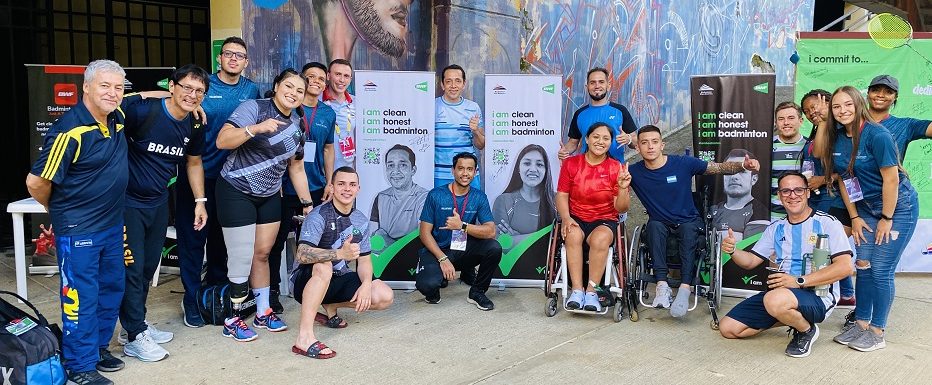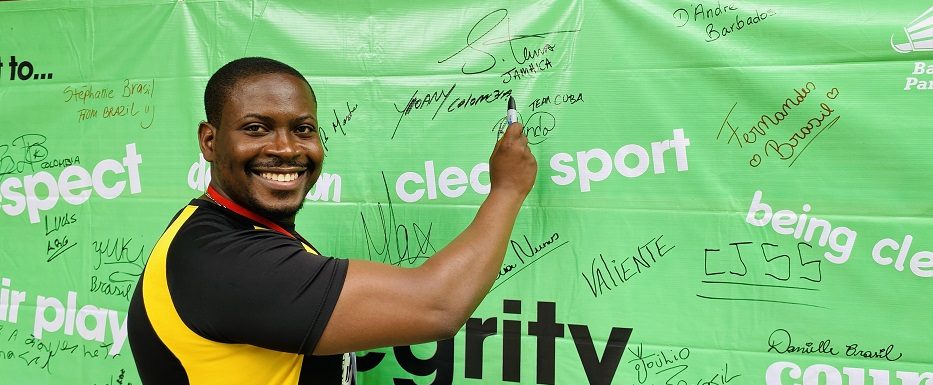Rights and Responsibilities
The most important message about rights and responsibilities is that “Every athlete has the right to clean and fair sport”.
To achieve this everyday, we all have responsibilities to apply excellent practice and respect and apply good sports values to keep badminton free from doping and match manipulation.
What are Athletes Responsibilities?
Athletes can be tested in- and out-of-competition, any time, anywhere and with no advance notice and within this means there are many obligations to fulfill. Furthermore, the principle of “strict liability” applies in anti-doping. This principle means that if it is in the athlete’s body, the athlete is responsible for it.
Athletes’ are responsible for: (but not limited to):
- complying with the BWF Anti-Doping Regulations and all relevant BWF policies, codes and competition regulations (Code of Ethics, Codes of Conduct, General Competitions Regulations, Laws of Badminton);
- being available for sample collection (urine or blood) – both in-competition and out-of-competition;
- everything that they eat, drink or take – ensuring that no prohibited substance enters his/her body and that no prohibited method is used;
- making sure that any medical treatment is not prohibited according to the Prohibited List in force and checking this with the doctor / physician that is prescribing the medication;
- applying to the BWF (or your national anti-doping organization) for a Therapeutic Use Exemption (TUE) if no alternative permitted treatment is possible and is required because of your medical condition;
- reporting immediately for sample collection after being notified of a doping control;
- ensuring the accuracy of the information entered on the doping control form during sample collection (including stating any medications and supplements taken within the seven days prior to sample collection, and where the sample collected is a blood sample, blood transfusions within the previous three months);
- cooperating with anti-doping organizations investigating anti-doping rules violations (ADRVs); and
- not working with coaches, trainers, physicians or other athlete support personnel who are ineligible on account of an ADRV or who have been criminally convicted or professionally disciplined in relation to doping (see WADA’s Prohibited Association List).
Athletes’ Rights and the Doping Control Process
The Doping Control process to collect urine or blood samples is a regular part of participation in sport? This is a very structured set of steps and the athletes have responsibilities to comply with the Doping Control Officer in that process, but also athletes have rights.
It is important during doping control, the athlete must remain within direct observation of the Doping Control Officer (DCO) or chaperone at all times from when the initial contact is made until the completion of the sample collection procedure. The athlete must also produce identification upon request.
What are athletes rights during Doping Control? (urine or blood sample collection). See the BWF statement on the rights of athletes during doping control (download above).
In summary – Athletes’ rights include (but are not limited to)during the doping control:
- bringing a representative and, if available, an interpreter;
- asking for additional information about the sample collection process;
- requesting a delay in reporting to the doping control station for valid reasons (International Standard for Testing and Investigations Art. 5.4.4); and
- requesting modifications for athletes with impairments (if applicable).
- requesting and attending the B sample analysis (in the case of an Adverse Analytical Finding); and
- in the case of an Anti-Doping Rule Violation (ADRV) being asserted, the athlete has the right to a fair hearing and the right to appeal the hearing decision.
What are athlete support personnel rights / responsibilities?
Coaches, trainers, managers, agents and other support personnel have a role in defending clean sport and supporting the athletes in the anti-doping processes.
Athlete Support Personnel’s’ obligations include (but are not limited to):
- knowing and complying with all applicable anti-doping policies and rules, including the BWF’s Anti-Doping Regulations; and
- refraining from possessing a prohibited substance (or a prohibited method)*, administering any such substance or method to an athlete, trafficking, covering up an anti-doping rule violation (ADRV) or other forms of complicity and associating with a person convicted of doping (prohibited association).
These are ADRVs applicable to Athlete Support Personnel under Article 2 of the World Anti-Doping Code and Article 2 of the IF’s Anti-Doping Rules.
* unless the Athlete Support Personnel can establish that the possession is consistent with a TUE granted to an athlete or other acceptable justification. Acceptable justification would include, for example, a team doctor carrying Prohibited Substances for dealing with acute and emergency situations.
Athlete Support Personnel’s rights include (but are not limited to):
- In the case of an ADRV being asserted, the Athlete Support Personnel has the right to a fair hearing and the right to appeal the hearing decision.



























